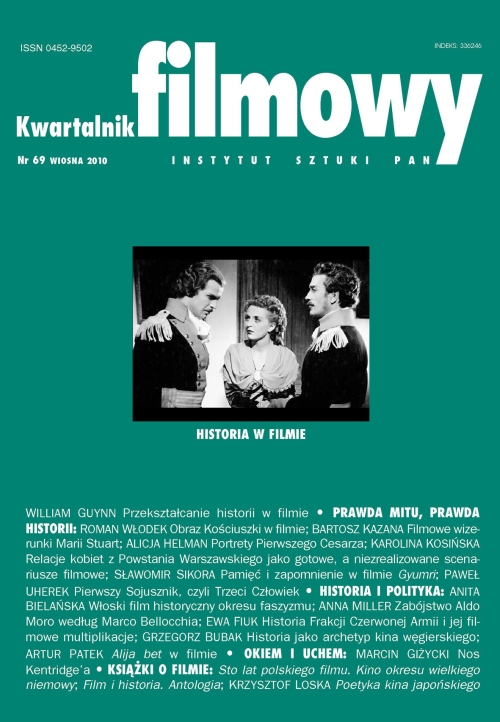Historia jako archetyp kina węgierskiego.Spojrzenie na 1956 rok z dzisiejszej perspektywy, czyli najnowsze filmy o rewolucji
History as an archetype of Hungarian Cinema.Year 1956 from the contemporary perspective –the revolution in recent films
Author(s): Grzegorz BubakSubject(s): Theatre, Dance, Performing Arts
Published by: Instytut Sztuki Polskiej Akademii Nauk
Keywords: Hungarian films; 1956 revolution; István Szabó; Miklós Jancsó; Zoltán Fábri; Márta Mészáros; Andor Szilágyi; Hungarian october revolution; "The Unburied Man"; Krisztina Goda; György Szomjas; "Mansfeld"; "Freedom and Love"; "The Sun Street Boys".
Summary/Abstract: The author analyses recent Hungarian films about the 1956 revolution. The need to return to the past was already present in films from the communist era, for example in films by István Szabó, Miklós Jancsó, Zoltán Fábri or Márta Mészáros. This suggested that history would remain an important element of the Hungarian cinematography. However the political changes of the late 1980s and 90s did not cause an increase in a number of historical films being made, even though they were no longer censored. The new reality was simply far more interesting than the past. It was possible that that the Hungarian october revolution would be long forgotten (which is what Kádár would have wanted) had it not been for the 50th anniversary of the revolution. Then as part of the celebrations, several films about the events were screened. They showed the revolution from various perspectives and represented a variety of styles. Films of note included Márta Mészáros "The Unburied Man" ("A temetetlen halott", 2004), Andor Szilágyi’s "Mansfeld" (2006), Krisztina Goda’s "Freedom and Love" ("Szabadság szerelem", 2006), and György Szomjas’ "The Sun Street Boys" ("A Nap utcai fiúk", 2007).
Journal: Kwartalnik Filmowy
- Issue Year: 2010
- Issue No: 69
- Page Range: 190-200
- Page Count: 11
- Language: Polish

